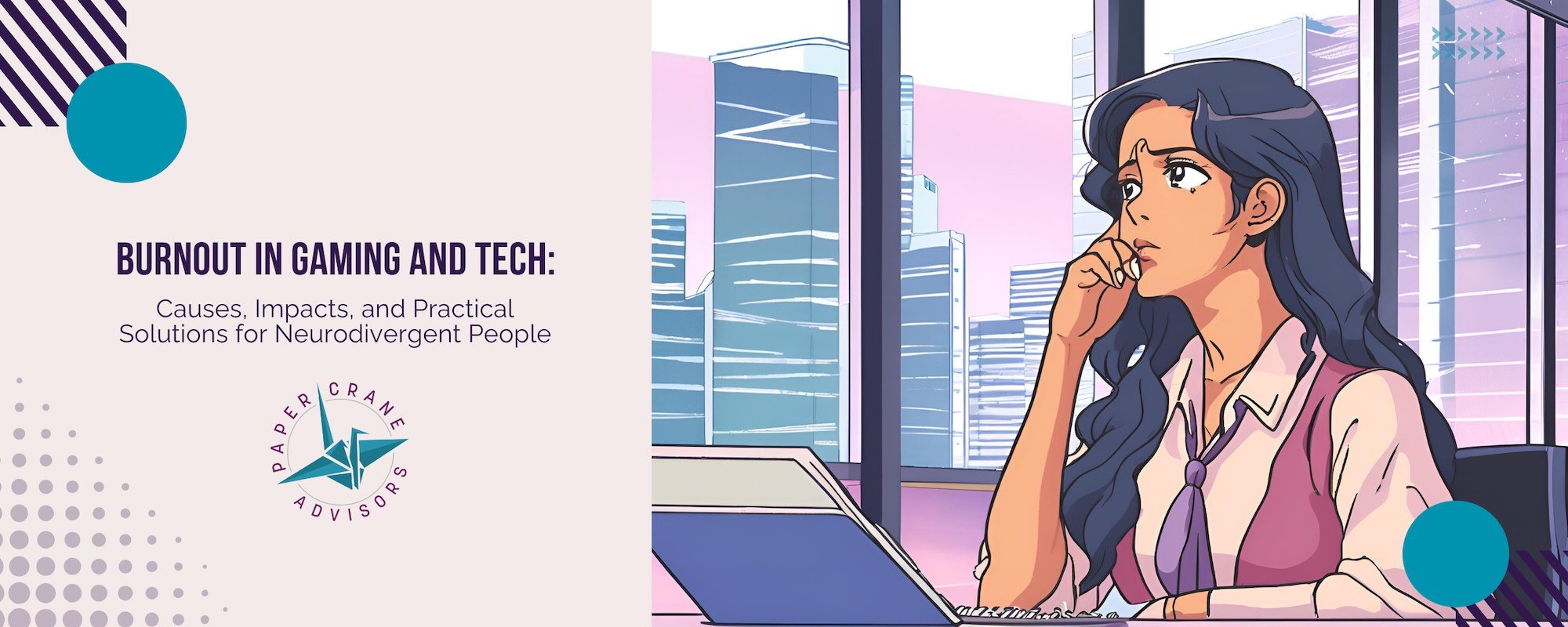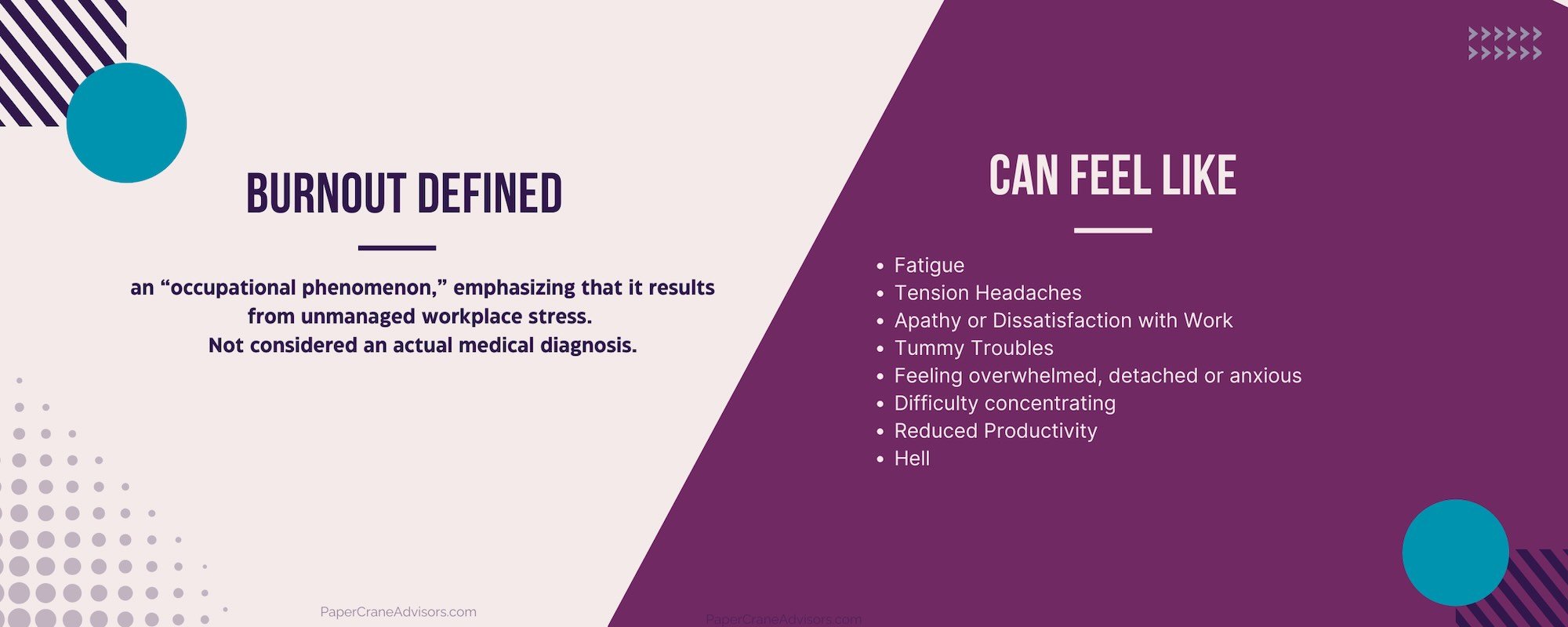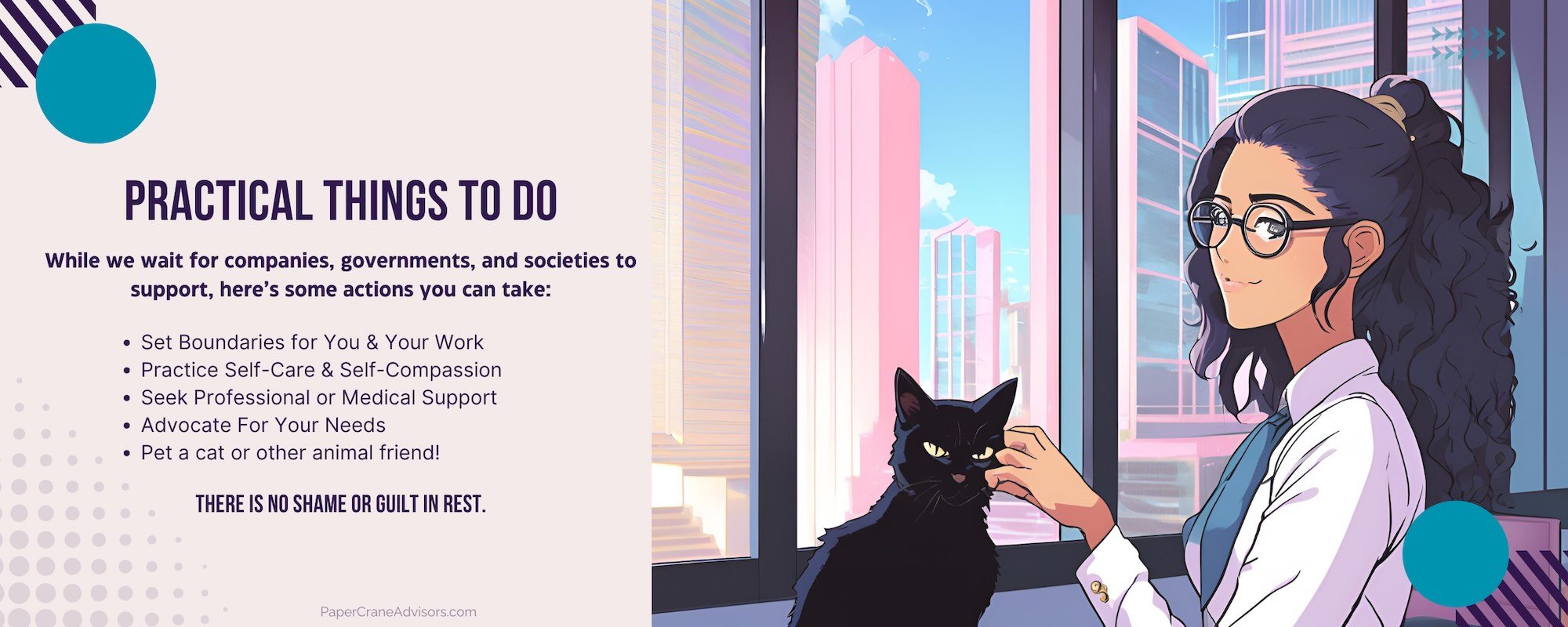Burnout in Gaming and Tech
Burnout is a hot topic and continues to be a growing concern for many segments of the workforce especially Gaming and Tech. These industries (like many) often face long hours, tight deadlines, and constantly evolving demands which can lead to physical, emotional, and mental exhaustion. Add being a neurodiverse human and we have a higher burnout rate than neurotypical folks and those statistics change per flavor of spice you have.
For example, a Code First Girls study suggests that a whopping 90% of female neurodivergent employees are burning out in tech. In general, across all neurodivergences there are shared reasons why:
Sensory Overload
Social and Communication Concerns
Emotional Regulation Challenges
Lack of Accommodations
Stigmas and Lack of Understanding
There are so many conversations about what it is, how to handle it, and let’s be real: some of them are not practical. But, understanding how burnout manifests and learning how to manage it are crucial.
WTF is Burnout?
Burnout is defined as a state of emotional, physical, and mental exhaustion caused by prolonged stress. Many jobs and roles from community management to development and beyond can have prolonged stress. In 2019, the World Health Organization (WHO) classified burnout as an “occupational phenomenon,” emphasizing that it results from unmanaged workplace stress. It’s a specific work thing, but people will use it to reference other parts of their life because frankly it effects everything in your life.
While technically not a medical condition, Burnout can appear like:
Fatigue
Tension Headaches
Apathy or Dissatisfaction with Work
Tummy Troubles
Feeling overwhelmed, detached or anxious
Difficulty concentrating
Reduced Productivity
Why Burnout is Prevalent in Tech and Gaming
Crunch Culture
I think y’all saw this one coming. The gaming industry is known to have something called: “crunch,” a period of intense work near project deadlines to get the game out on time. In 2023, International Alliance of Theatrical Stage Employees’ (IATSE) Gameworkers.org Rates and Conditions survey found that most respondents said they worked an average of 40 hours a week, but a quarter of people who answered said they worked for 41+ hours; with the longest reported average was 95 hours a week! And 58% of these folks said they were salaried employees or exempt (meaning: no overtime).
Fast-Paced Innovation
Our industries are super cool in that they thrive on rapid innovation. New ideas! New Products! Updates! Fixes! Startup! While exciting, it can fell like a constant push to release something “new” and create a false sense of urgency or perpetual pressure.
Constant Connection
In the US, the 8-hour work day actually came to pass in 1869 for federal employees first before working its way through unions until 1940 when the amended Fair Labor Standards Act limited the work week to 40 hours per week by law. Back in the day, you left work and you literally left work. Now, we have phones on our wrists… Between getting calls, texts, Telegrams, Slacks, Teams messages, emails, etc, the lines between home and work are getting blurred and often times we feel compelled (though not necessarily required) to constantly “check in” even when we’re away, on vacation, or just grabbing a cup of coffee. To help ease this stress for workers, as of August 2024 about 17 countries have Right to Disconnect laws on the books including France, Australia, Spain, Mexico, Ukraine, Chile, Greece, and more.
With superpowers like creativity, innovation, hyperfocus, analysis, and such, gaming and tech seems like home for many neurodivergent folks across the expanse of roles and opportunities; however, with the above industry factors mixed with neurodivergent needs, we are often more susceptible to burnout more than our neurotypical peers. While this doesn’t mean burnout is inevitable, certain factors can contribute to higher burnout risk as those mentioned above. Things like Cognitive Overload in these repetitive environments can lead to elevated frustration and stress levels. Or constant Masking and Social Pressures can add to this overload where the act of fitting in is constantly mentally and emotionally exhaustive. If you’re hit with crunch in an open office space, that can set off struggles with Executive Function and time management that are aggravated by Sensory Sensitives. I don’t think I need to detail the cycle of hyperfocus to exhaustion to lack of self-care to burnout; rinse and repeat.
How to Practically Help Burnout
I think my favorite tip to recover from Burnout was “take 3 months off, away from work and reset.” While I appreciate the vibes and would love to do that, only 5% of companies offer paid sabbatical. Yes, companies and governments need to help support workers health (mental, physical, emotional), but let’s talk about what we can do ourselves, right now.
Set Boundaries for Yourself and Company & Rest
Ever start a new job and want to be the go-getter that works late and does all the things? You are training your boss, peers, the company that this is acceptable and expected of you. While it may feel like you need to impress and show up, it’s much better to prioritize your time and be able to rest appropriately.
Alex Soojung-Kim Pang, founder of Strategy & Rest and author of several books on the subject, recently explained to CNBC that “even when our brain is resting, it’s still active, engaging its ‘default network’ to problem-solve, think creatively and seek out new information.” Not only are you more productive, more creative, but way less pissed-off in a better brain space to be your best you.
As always, find a system that works for you. I’m fully aware that I am not a doctor, emergency responder, etc and have the luxury of not needing to be on call to save lives, but I personally have a very hard time disconnecting, so I set some rules for myself and my peers and bosses. For example, I haven’t had business email on any personal device since 2011. If my job is that “important” to have connection 24/7, I’ve asked the company to provide me a work phone. I also have time blockers on the work apps I do have on my phone (and a few others to help me stop doom scrolling and sleep).
You can:
Wholly remove business apps from personal phone if possible
Block business apps after certain hours of the day – my favorite is ScreenZen
Shockingly, I’ve found that if someone really really needs me, they’ll call me on the phone. It has happened once in the past 10 years.
If you do work remotely or work-from-home, try to have an “office;” a space that is your place to work that you can walk in and out of or lock your work stuff like laptop when you’re “done.” Creating a physical space and wall can help you shift mindsets from work brain to home brain.
Practice Self-Care & Self-Compassion
Don’t get me wrong, I love me a good bath with candles, but what “self-care” really is taking the time you need to nurture your physical, emotional, and mental health. This looks different for everyone. It could be regular exercise or joining a local soccer team, mindfulness practices such as yoga or meditation, proper nutrition like not skipping lunch at work, or taking breaks to go to the bathroom. As you can feel burnout in your body, get that massage, see your doctor regularly, etc. Create a transition moment for yourself between “work time” and “off time” like maybe you get to listen to your favorite podcast for 20 minutes, or go for a walk, or eat a tasty snack. Some tradition that makes that space of a moment.
Self-Care is taking care of you and Self-Compassion is not feeling bad about it.
You’re a whole complete human who deserves to be comfy, happy, healthy, and in the place you feel best in your life.
Seek Support & Take Time Off If You Need To
If Burnout is impacting your mental health, consider reaching out to a therapist or mental health professional for some direct support. Sometimes Burnout can make us feel like we’re questioning our sanity; get your thoughts and feelings out in a supportive environment. While “Burnout” itself doesn’t qualify for FMLA, it can lead to things that do. Speak to a professional.
Advocate For Your Needs or Accommodations
I realize I said the “A” word again, but flexible working hours or adjusted space options can help with reducing Burnout and increasing sustained recovery. Or if you’re Burnout is coming from sensory stressors, ask for what you need to help yourself.
Pet a Cat
…or a dog or any pet you love! For real! The American Psychiatric Association noted the benefits of having a pet such as reducing stress and anxiety, providing a calming presence and more. If you can’t have a pet of your own, borrow a friend’s dog for a walk, go to a cat café (we have a cat yoga place where I live), pet sit, volunteer at a shelter, or get a pet-friendly workplace.
Take care of yourself and each other
Burnout is a serious issue, and hopefully you never get there, but it can happen to the best of us. Set boundaries, rest, practice your self-care compassionately, and seek support when you need it. Pets are cool, too.



